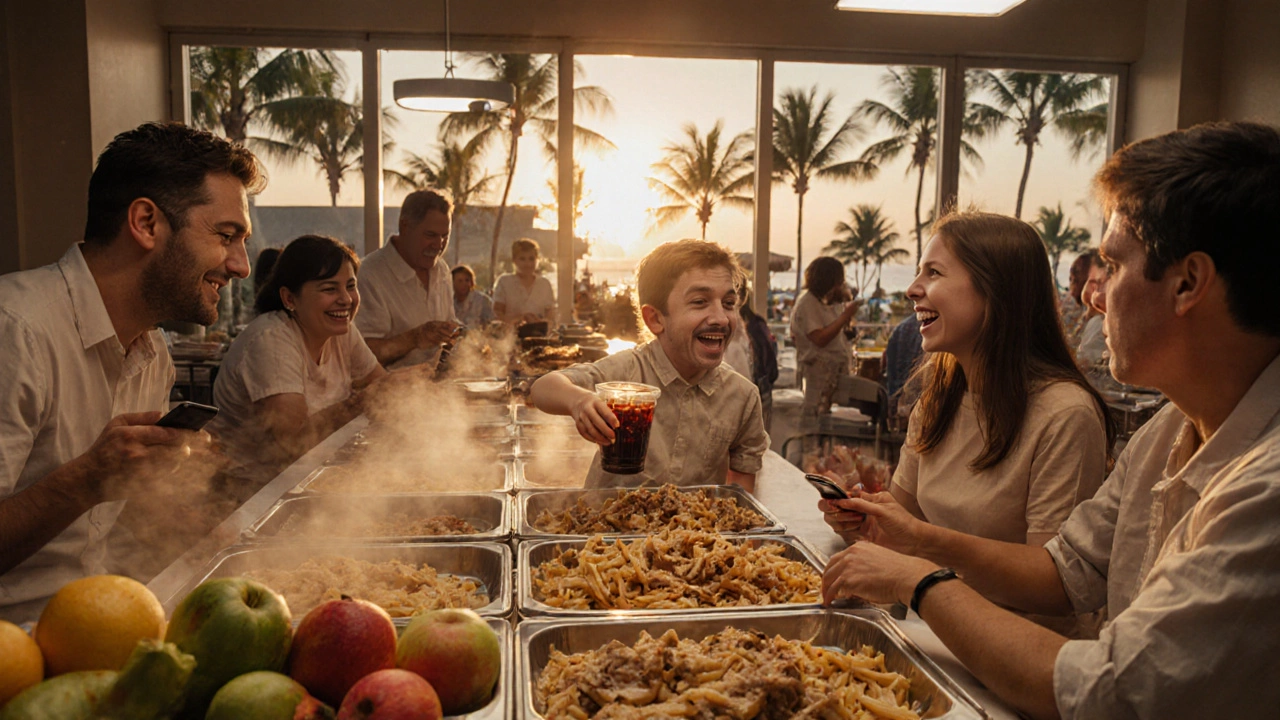All-Inclusive Hotel Cost Calculator
Calculate Your Savings
Enter your vacation details to see if an all-inclusive resort will save you money compared to booking separately.
Your All-Inclusive Details
Your Travel Habits
Results
You’ve seen the ads: sun-soaked beaches, endless cocktails, buffet spreads that never close. All-inclusive hotels promise a stress-free getaway where everything’s covered. But here’s the real question: is it worth paying all-inclusive? For some people, yes. For others, it’s a money trap. Let’s cut through the marketing and see what you actually get - and what you’re giving up.
What You Actually Get With All-Inclusive
All-inclusive means your room, meals, drinks, and some activities are packed into one upfront price. No surprise bills at checkout. That’s the promise. But not all all-inclusives are the same. A resort in Cancún might include premium rum and nightly shows. A smaller property in the Dominican Republic might serve bottled water and a single buffet per day.
Most all-inclusive packages cover:
- Accommodation in a standard room
- Three meals a day, usually buffet-style
- Basic drinks - soft drinks, local beer, house wine, and simple cocktails
- Snacks between meals
- Non-motorized water sports (kayaking, snorkeling)
- Some daily activities (yoga, dance classes, trivia nights)
What’s often excluded? Premium alcohol, specialty restaurants, spa treatments, Wi-Fi, tips, and excursions. So if you’re planning to sip top-shelf tequila or take a snorkeling trip to a coral reef, you’re still paying extra.
The Hidden Costs No One Tells You About
Here’s the catch: all-inclusive doesn’t mean unlimited. It means limited access to unlimited stuff. You can’t just walk into the steakhouse every night - you might need a reservation, or it’s only open two nights a week. The ‘all-you-can-drink’ bar? It’s usually the house brand. If you want a Grey Goose martini, you’re out of luck.
Many guests don’t realize they’re paying for things they don’t use. If you’re the type who likes to explore local food markets, sip coffee at a sidewalk café, or take a day trip to a nearby town, you’re locking yourself into a resort that’s designed to keep you inside. You’re paying for a full buffet you’ll never eat, drinks you won’t touch, and activities you don’t care about.
And let’s talk about the quality. In some all-inclusives, food is mass-produced. Think rubbery chicken, lukewarm pasta, and fruit that’s been sitting out since breakfast. You’re trading authenticity for convenience. One traveler in Jamaica told me she spent her entire week eating the same rice and beans with a different protein each night - and still paid $450 per person per night.
Who Actually Saves Money?
All-inclusive only makes sense if you’re going to use everything. Think about your habits:
- If you drink alcohol regularly - especially beer or wine - you’ll likely come out ahead.
- If you eat three meals a day and hate dining out, the buffet saves you time and cash.
- If you’re traveling with kids, the convenience of having snacks and meals ready is priceless.
- If you’re not planning to leave the resort, you’re not wasting money on excursions you won’t take.
Here’s a real example: A couple in their 50s booked a 7-night stay at an all-inclusive in Mexico. They drank two cocktails daily, ate all meals on-site, and did a few snorkeling trips included in the package. Their total cost: $2,100. If they’d booked a regular hotel and paid for meals and drinks separately, they’d have spent about $2,800. That’s a $700 saving - and they didn’t have to track a single receipt.
But another couple - same resort, same price - spent most of their days exploring local towns, eating at family-run restaurants, and sipping fresh coconuts on the beach. They ended up spending $1,500 on food and drinks outside the resort. Their all-inclusive fee was $2,100. Total: $3,600. They paid more than if they’d just booked a hotel and paid as they went.

When All-Inclusive Is a Trap
It’s not just about money. It’s about experience. All-inclusive resorts are designed to be self-contained. You’re in a bubble. The staff doesn’t speak much local language. The food isn’t regional - it’s internationalized for mass appeal. You miss out on culture, flavor, and connection.
One traveler in Bali told me he spent his entire trip in his resort, only leaving once to buy sunscreen. When he returned home, he couldn’t remember what the local food tasted like. He paid $5,000 for a vacation that felt like a hotel in Omaha - just with palm trees.
Also, all-inclusives are often crowded. You’re sharing pools, beaches, and restaurants with hundreds of other guests. If you’re looking for peace, quiet, or privacy, you’ll be disappointed. The cheapest rooms are often the smallest and farthest from the beach. You might pay $400 a night for a room that looks like a motel from the 90s.
Alternatives That Give You More Control
You don’t have to choose between all-inclusive and a bare-bones hotel. There are middle-ground options:
- Breakfast-inclusive resorts: You pay for your room and breakfast. Everything else is on you. Great if you like to explore but want a solid start to the day.
- Resorts with meal credits: Some places give you $50-$100 per day to spend on food and drinks. You can use it at the resort or nearby restaurants.
- Booking a villa with a kitchen: Buy groceries, cook your own meals, and still enjoy a pool and beach access. Much cheaper, and you get real local flavor.
One family in Costa Rica rented a villa with a kitchen for $120 a night. They bought fresh fruit, fish, and bread from the local market. They ate out twice a week at a beachfront restaurant. Total food cost: $180 for the week. Their all-inclusive option would’ve cost $250 a night - over $1,700 for the same time.
How to Decide: A Simple Checklist
Before you book, ask yourself these questions:
- Do I plan to stay on the resort most of the time? (If yes, all-inclusive might work.)
- Do I drink alcohol regularly? (If yes, you’ll likely save money.)
- Do I care about local food and culture? (If yes, skip all-inclusive.)
- Am I traveling with kids or elderly people who need convenience? (If yes, it’s a strong contender.)
- Can I find a deal where the all-inclusive price is under $200 per person per night? (If yes, it’s a better value.)
If you answered yes to #1 and #2, and no to #3, go for it. If you answered yes to #3, look elsewhere.
Pro Tip: Book Smart
If you’re still considering an all-inclusive, here’s how to avoid getting ripped off:
- Check the fine print: What’s included? What’s extra? Is Wi-Fi paid? Are tips included?
- Read recent reviews - not the 5-star ones from 2019. Look for complaints about food quality or hidden fees.
- Compare the all-inclusive price to booking room + meals separately. Sometimes, booking a regular hotel and adding a meal plan is cheaper.
- Avoid peak season. Prices double around holidays. Book early or travel in shoulder season.
- Use travel credit cards that offer free nights or resort credits. That can offset the cost.
One person in the Caribbean used a credit card with a $200 resort credit and saved $200 on drinks and spa treatments. That made the all-inclusive feel like a bargain.
Final Verdict
Is it worth paying all-inclusive? It depends on you - not the resort. If you want to relax, drink, eat, and never think about money again - and you’re okay with limited choices - then yes. It’s worth it.
But if you want to taste the local food, walk through markets, meet real people, or just have a quiet moment away from crowds - then no. You’re paying for a theme park, not a vacation.
The best vacations aren’t the ones with the most included. They’re the ones that match your rhythm. Choose the option that lets you be yourself - not the one that sells you a fantasy.
Are all-inclusive hotels really cheaper than booking separately?
It depends. If you drink alcohol, eat all meals on-site, and don’t leave the resort, yes - you’ll likely save money. But if you explore local restaurants, prefer fresh food, or skip the bars, you’ll end up spending more. Always compare the all-inclusive price to booking a hotel plus estimated meal and drink costs.
What’s the biggest mistake people make with all-inclusive resorts?
They assume everything is included. Many forget that premium drinks, Wi-Fi, tips, spa services, and excursions cost extra. Some guests end up paying hundreds more than expected because they didn’t read the fine print.
Are all-inclusive resorts good for families?
Yes, if your kids eat a lot and you want convenience. Most all-inclusives have kids’ clubs, poolside snacks, and buffet meals that cater to picky eaters. But if your family likes to explore or needs fresh, varied meals, a villa with a kitchen might be better and cheaper.
Can you get good food at all-inclusive resorts?
Some do - especially higher-end ones with themed restaurants and local chefs. But many serve standardized, mass-produced food to handle large crowds. The quality varies wildly. Always check recent reviews for comments about food. If people say "bland," "rubbery," or "same thing every night," walk away.
Is it better to book all-inclusive through a tour operator or directly with the hotel?
Book directly with the hotel when possible. Tour operators sometimes add hidden fees or lock you into rigid packages. Booking direct gives you more flexibility to upgrade, change dates, or use hotel credits. Plus, you’re more likely to get a better room or early check-in.

